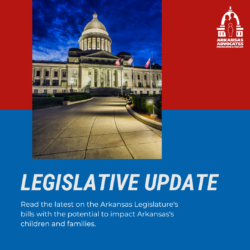
On April 10, Arkansas legislators convened for the 2024 Fiscal Session. The purpose of fiscal sessions is to consider budget bills and to approve the Revenue Stabilization Act (Arkansas’s balanced budget law that sets spending priorities for the state). Arkansas’s fiscal sessions take place in even-numbered years and last only 30 days, unless extended with a three-fourths majority vote in both chambers. With disagreements over the appropriation for the Arkansas Game and Fish Commission, the fiscal session expired at midnight on May 10. We should expect to see a special session called in June to resolve the issue.
Of course, several noteworthy issues arose during this year’s session. Find a summary below!
Revenue Stabilization Act: The Arkansas Senate and House of Representatives voted to send Governor Sarah Huckabee Sanders identical bills that would boost the state’s general revenue budget by 1.76% or $109.3 million to $6.31 billion in the coming fiscal year. The final budget was essentially the same as that proposed by the Governor.
Maternal Health: A new law clarifies the state’s role in keeping postpartum women insured if they have Medicaid coverage when their babies are born. Rep. Aaron Pilkington sponsored the legislation that is attached to the Medicaid budget. Currently, women with Pregnancy Medicaid coverage lose their coverage 60 days after giving birth. Arkansas is one of only a few states that has not extended Pregnancy Medicaid coverage for a full year after the baby’s birth. This new “special language” in the Medicaid budget requires that the Arkansas Department of Human Services (DHS) redetermine eligibility for postpartum mothers before they lose coverage and transition them to another Medicaid category if they’re eligible. This is a requirement under federal law, but the new law clarifies the state’s role.
The Governor’s Strategic Committee on Maternal Health met on April 22. Health professionals and advocates from around the state gathered to talk about maternal health needs and gaps. This was the first of what is supposed to be a series of coalition meetings.
Rep. Mary Bentley appropriated $500,000 toward starting a Midwifery program at the University of Arkansas for Medical Sciences. Unfortunately, this win comes with a loss. The money allocated was taken from Arkansas Center for Health Improvement (ACHI), a health data collection, research, and public policy organization imperative to the work of health advocates across the state. This loss of $500,000 accounts for 7% of ACHI’s budget.
Gov. Sanders signed a $2 million allocation to “non-healthcare entities,” also known as pregnancy resource centers, which are often religiously affiliated and discourage abortion while encouraging birth. This doubles the amount previously allocated to pregnancy centers.
Education: Gov. Sanders issued an executive order that instructs Arkansas schools to ignore the federally updated Title IX regulations that will take effect August 1. This order could result in the loss of much-needed federal funding. Arkansas has joined more than a dozen other states in filing a lawsuit challenging the Title IX updates prohibiting discrimination based on gender identity, sexual orientation, and sex characteristics.
Voting and Democracy: State lawmakers approved an emergency rule barring election officials from accepting voter registration forms signed with an electronic signature. Applicants will be required to sign voter registration forms by hand with a pen, also known as a “wet signature.” This will take effect Saturday, May 11, and it will be in place for 120 days while state election officials work on a permanent rule (the rule-making process requires opportunities for public input).
Preemption: Two bills to regulate crypto mining in Arkansas were signed into law addressing concerns over noise, regulation and foreign ownership of crypto mines. The legislation gives localities back the authority to pass ordinances aimed at regulating crypto mines.
Arkansas PBS funding: An effort by Sen. Dan Sullivan to reduce Arkansas’s Public Broadcasting Service (PBS) cash appropriation (the monies PBS raises through donations, grants, etc.) by 20% narrowly failed in the Joint Budget Committee. A separate attempt by Rep. Wayne Long on the floor of the House to eliminate general revenue funding for PBS failed. Rep. Long stated that the goal of 0% income tax would require cutting spending, and that, “Defunding Arkansas PBS would be a small step toward having smaller, more affordable government.”
State Employee Pay: State employees are set to receive “a market adjustment” of up to 3% of their base salary starting July 1. State employees will now have a minimum salary of $32,405.
Leadership: Sen. Bart Hester won the Senate’s nomination for Pro-Tempore-designate over contender Sen. Terry Rice. The House of Representatives elected Rep. Brian Evans as its House Speaker designate. Evans was opposed by Rep. Johnny Rye and Rep. Jack Ladyman, who withdrew himself from the race citing a family emergency.
Lectern Update: The audit over the infamous $19,000 lectern became public during the session. The audit report was sent to both Attorney General Tim Griffin and the Sixth Judicial District Prosecuting Attorney Will Jones. It is up to their discretion to act or not. Former President Pro-Tempore, Sen. Jimmy Hickey and House Chair of Judiciary, Rep. Carol Dalby were both publicly critical of the purchase.
In response, Rep. Julie Mayberry attempted to pass special language to bring the governor’s administration and other members of the executive branch under the heading of an “agency” to clarify purchase reporting requirements. She got a lot of heat from the committee and her amendment flopped, not even receiving a motion for approval.
